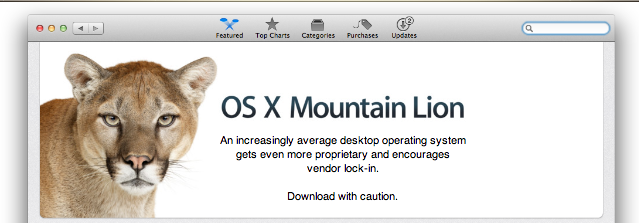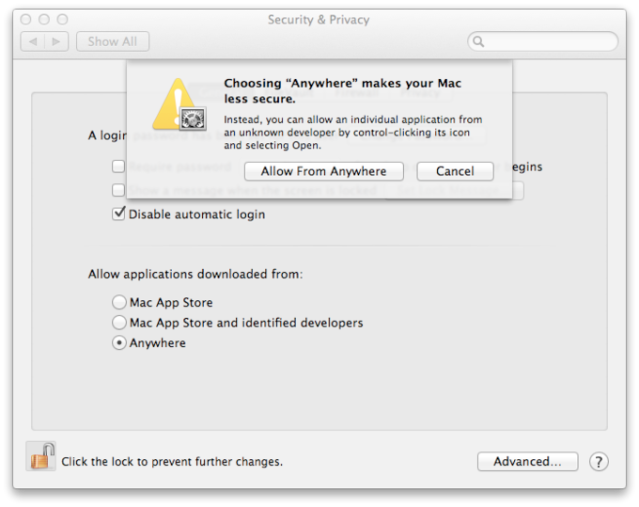Mac OSX Mountain Lion 10.8: vendor lock-in for the masses?

Chris Betcher on his problem with upgrading to the latest release of the Mac operating system:
It’s not that I don’t like their products. I do. I have several Macs, iPads, iPhones, and Apple TVs. Walled garden or not, they build beautiful products that – for the most part – do exactly what they claim… they just work. While I don’t always approve of their proprietary attitude to the way they build their products, I understand the design goals that such a hardware and software symbiosis achieves, and I would still ra use a Mac than any o machine.
It seems from the lengthy Ars Technica review of OSX Mountain Lion 10.8 that Apple’s betting on locking into iCloud. Big time:
The overall message from Apple is loud and clear: thou shalt save thy documents in the iCloud, and thou shalt interact with those documents primarily through the applications that created them. (Thou mayest still employ the old ways by clicking “On My Mac” ere opening or saving documents. But seriously, consider using iCloud instead.)
At the same time, the Mac App Store is starting to look a lot more like the iOS store – i.e. telling developers that unless Apple can take a cut of their profits, they’re unwelcome on users’ systems:

One of the attractions of using Apple devices is that you can get stuff done on them without having to worrying, for example, about random blue screens of death. However, it seems that those who do know their way around a computer are increasingly frustrated by Apple’s approach. Back to Chris Betcher:
I’ve been using personal computers for a long time. I’ll happily admit to being a “power user” and I ra object to Apple’s insistent belief that they need to dumb down my computer because they think I can’t cope with a file system, or that I should suddenly start scrolling in the opposite direction because it’s more “iPad like”, or that I should have fewer choices available because I need to have the software decide what’s best for me.
I’m all for making it easier to get things done with computers and o digital devices. What I’m not in favour of is simultaneously creating a walled garden for vendor lock-in. e are o ways – open standards anyone?
By the way, one of the best ways of reading that Ars Technica review is to add it to Pocket which then formats it really nicely without having to click for the next page (or be online, for that matter). 🙂


Why would you use / recommend Pocket, a proprietary reader that gets between you and native web content?
All the big guys are creating ecosystems intended to create stickiness or lock in. I am not being an Apple apologist – I agree they are trying to create lock-in with iCloud. I have yet to save any documents with the app that created them, and for the most part keep it turned off since I have files on Dropbox and contacts, calendars, etc. through Google.
The Google syncing is through relatively open standards.
Dropbox is an app and the files are “just” files.
I’m not sure what open standards would replace / replicate iCloud? Should operating systems with cloud features require first-class hooks so that competitors can implement compatible interfaces? Google Drive, MSFT Skydrive, and Dropbox?
These are all interesting questions as we head farther away from “professional” computing, to casual / mass market computing.
Hi Boris, thanks for the comment. 🙂
In response to your points I’m not really sure why iCloud needs ‘replicating’?
I think that keeping files in the “cloud” where people don’t have to worry about backup, viruses, or keeping track of revisions, as well as being able to access on any computer or device, re-use, and share them easily with others is a useful innovation.
It makes files and computers easier and less scary for the mass market.
Like OpenPhoto, an option that gave all the benefits but let me host on space I own would be fantastic.
( what, no response to my Pocket troll?! 😛 )
I think remote storage that syncs files is useful. I don’t think calling it ‘the cloud’ is useful – and I certainly don’t think vendor lock-in via iCloud (which even I’d have difficulty explaining to users) is useful either.
(If there was an open version of Instapaper/Pocket/Readability I’d be all over it)
This is a transition we’ve seen in the world of virtualization, too: closed “cloud” providers established the value of the concept, but eventually broad acceptance of the concept drives the market towards commoditization. Without that transformation, it turns into sharecropping: users being held hostage to the company that holds their files and connects their devices.
A couple of friends and I were writing about the long-term need to cloud storage, combined with tailored devices to access portions of the cloud in context-appropriate ways, quite a few years ago. It’s interesting to see it coming together, and predictable (if disappointing) to see so little interoperability in this first generation.
An open standard for cloud storage and data synchronization is the equivalent of cell phone number transfers between carriers — a terrible idea for the dominant players, but a big win for consumer choice.
indeed. I quite like the look of Unhosted: http://unhosted.org
Hi Doug,
I don’t think Apple are really dumbing down my box. I just upgraded my work macboom to mountain lion. All the commandline applications I’ve installed (e.g. ffmpeg, lame, exiftool and the like) still work. I installed home-brew then imagemagick and tesseract to do some fairly interesting stuff: http://johnjohnston.info/blog/?e=2312
I am delighted that Apple will keep my mum’s mac nice & safe but will give me lots of fun. I don’t think right/control clicking an unsigned app to run is much of a jump for a ‘power user’ as I can manage that.
Hi John. Indeed, but it’s a step on the road to vendor lock-in for all but the most knowledgeable of users. :-/
I think at some point we have to stop wringing our hands about this kind of stuff. Either we believe in it enough to use something else that is more to our liking or we don’t; there’s certainly competition in the mobile, desktop, cloud storage and even ecosystem space.
While there are some problems with (for example) the Mac App Store stuff like some applications not being able to be sold through the store because their functionality is incompatible with the sandboxing restrictions, the main drive on the store seems to be toward greater cross-device interoperability and security (both through signing and sandboxing). Contrast this with more open stores like the different Android stores, where multiple reports have indicated that malware is a very real and growing threat.
I’m not sure I get the point about stuff like iCloud. The whole point of the service is so that you can have seamless integration of app behaviour (through files, settings and so on) over multiple _Apple_ devices. It’s not generic cloud storage like Dropbox, SugarSync etc. Software is already more than capable (except where they link to a page where you might actually pay for a service *sigh* prime screwup on Apple’s part with the terms of service there) of using whatever cloud storage system they like to store files: no lock-in at all.
(Also what’s with the ‘e’s and ‘o’s without words there Doug?)
Hi Rob, thanks for the comment. Sorry about the random letters – not sure what happened there!
The issue I have isn’t that Apple have a cloud storage facility or that one can buy apps through the Mac App Store. My issue is with it being built into the operating system. It’s Microsoft Windows/Internet Explorer all over again…
Actually I think the “you’ll only use our webkit stuff on iOS” is the whole MS/IE thing all over again, which for some reason is being ignored by most people.
BUT
The origin of the MS/IE antitrust thing was that Windows was abusing a monopoly position, which Apple, for all its cash, is not, either in the mobile or the desktop space. Similarly, MS still has agreements with OEMs which it uses to control how hardware is sold (eg all the hoo hah a while back about giving the option to put Linux on a computer instead of Windows). Apple’s situation is about selling Apple hardware with Apple software on it, which is pretty different for the most part.
(On a semi-related note, I can’t believe the MS/IE stuff is still going on in Europe.)
(Argh, replying to myself since the edit window decided to be unusable)
To use the much maligned car analogy, noone is railing at Ford because they can’t use Mazda’s dashboard software on their new car.
So the default ‘Save to iCloud’ isn’t problematic? With a car the dashboard software is a sideshow. A better analogy would be if the satnav always directed you to Shell garages by default.
Not considering you can also save to disk or Dropbox folder or whatever other service you can quite easily install on your computer, no. If alternatives are there and not actively being blocked (and setting up Dropbox for example is almost as easy as signing up for iCloud), I really don’t think there’s any need to apologise for making things like cloud storage easy.
OK, so going back to the Microsoft Windows/IE point, the reason Mozilla created Firefox was because people saw IE as ‘the internet’.
Because of this, Microsoft didn’t feel like it had to adhere to web standards and could do pretty much whatever it liked. Thankfully, the situation is different now.
Likewise, if people start to think of iCloud as ‘the cloud’ we’ll end up with similar problems. It’s not for no reason that the EU forced Microsoft to introduce a randomised ‘browser choice’ screen in later versions of Windows!